Once a relatively unknown pastime, pickleball has gained significant traction in Singapore in recent years. The sport, played with hard paddles and a hollow, perforated plastic ball, now boasts 30 to 40 active groups and an estimated 1,500–2,000 regular players islandwide. Its appeal spans ages from seniors seeking low-impact exercise to youths drawn by its fast-paced fun. Community centres and void deck courts alike echo with the distinctive “pop” of pickleball, reflecting how quickly the game has become an integral part of HDB estate life.
But pickleball’s signature sound, the sharp pop of paddle meeting ball, has stirred tension in Singapore’s high-density residential heartlands. Residents living around HDB common areas have lodged complaints that pickleball play is disruptively noisy, with the hard thwack of the ball on the paddle reverberating off the concrete blocks. “The sound of the ball is penetrating and loud,” lamented one Serangoon resident who works night shifts and is often jarred awake by morning games. Unlike the muted thud of a shuttlecock in badminton, pickleball produces sharp, high-frequency bursts of noise. Acoustics experts note that a pickleball match can reach around 70 decibels at 30 metres – roughly equivalent to a vacuum cleaner – and the noise can carry “hundreds of meters”. In the enclosed courtyards of HDB estates, the effect is amplified. “The hard court location is very bad design… noise travels and is bounced back by the surrounding apartment blocks,” one frustrated resident observed. Indeed, some have even dubbed pickleball “the most annoying noise in the world” – an obvious exaggeration, but one that captures the very real fatigue of those subjected to the constant pop-pop-pop.
In 2023, noise grievances surfaced across several estates. A Serangoon North resident took to social media to decry the daily pickleball sessions that prevented him from sleeping after his night shifts. Over in Yew Tee, a resident living near a multi-purpose court had described the nightly games as a “major disturbance”, reporting that “loud ‘popping’ sounds can be heard up to the 10th floor” and asserting that his decibel readings exceeded 60 dB late into the evening. And at Marine Parade’s Marine Crescent, “some residents… have been losing sleep” due to early-morning pickleball play on the hard court in front of Block 47. These complaints underscore a growing tension: one person’s healthy recreation has become another’s noise nuisance.
As the sport expands into shared public spaces, Town Councils have come under pressure from residents citing noise disturbances. Some Town Councils have introduced time-based regulations, while others have gone as far as banning the sport from estate courts. This article examines the legal authority of Town Councils in regulating such recreational activities, the potential consequences of outright bans, and the need for balanced policies that preserve both peace and play.
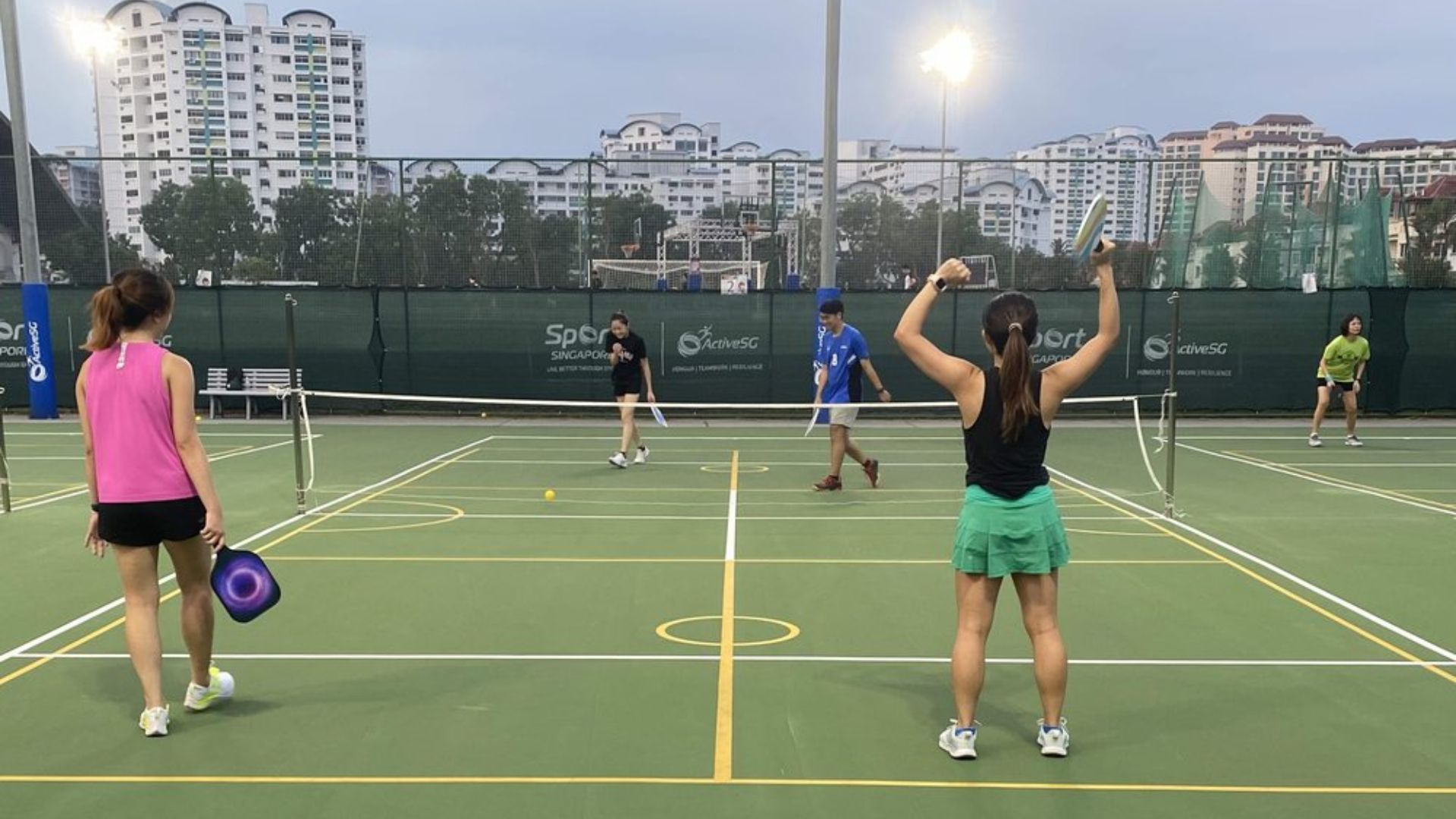
Town Councils’ Authority Over Common Property Use
In Singapore, Town Councils are empowered by law to manage and maintain HDB common property in their respective towns. This authority is grounded in the Town Councils Act (TCA), which grants elected Town Councils control over amenities such as void decks, corridors, and recreation areas. Under Section 24 of the Act, a Town Council may make by-laws “for regulating the control, management, administration, use and enjoyment of the common property” in HDB estates. In essence, Town Councils have the legal mandate to set rules on how shared spaces, including outdoor hard courts, are used by residents. They can also enforce these by-laws, with breach of any Town Council by-law being an offence liable to fines of up to $5,000 upon conviction.
Leveraging the TCA’s powers, most Town Councils have implemented by-laws to regulate recreational activities on common property. A typical provision (found in many Town Council by-laws) prohibits anyone from playing games on common property, except in designated areas. For instance, Sengkang Town Council’s by-laws state that “a person must not… play or take part in any game on any common property or in an open space, except in an area designated for that activity.” This means sports like football, badminton or pickleball should be confined to the appropriate courts or spaces set aside for them. The intent is to prevent ad hoc play in unsuitable locations (e.g. void decks, carparks) that could cause damage, danger or inconvenience. Notably, such by-laws specifically contemplate games that might cause “discomfort” to others or require exclusive use of an area. In other words, Town Councils can lawfully restrict or even prohibit certain activities on estate grounds if they pose a nuisance or safety issue to other residents.
In addition to their rule-making powers, Town Councils have a responsibility to ensure the estate environment remains livable. The law explicitly includes nuisance abatement as part of a Town Council’s duties. If a competent authority (for example, the Housing Board or the National Environment Agency) directs the Town Council to abate a nuisance on common property, the Town Council must take action. Excessive noise emanating from common areas could well be deemed a “nuisance” in this context. In practice, noise from communal facilities is primarily left to Town Councils to manage, as HDB’s own guidelines note. Town Councils handle noise issues from playgrounds, pavilions, and courts, and “activities that will likely create noise nuisance cannot be carried out after 10:30pm.” Thus, Town Councils act as the first line of control for estate noise problems, with clear authority to regulate usage hours or impose conditions on noisy activities.
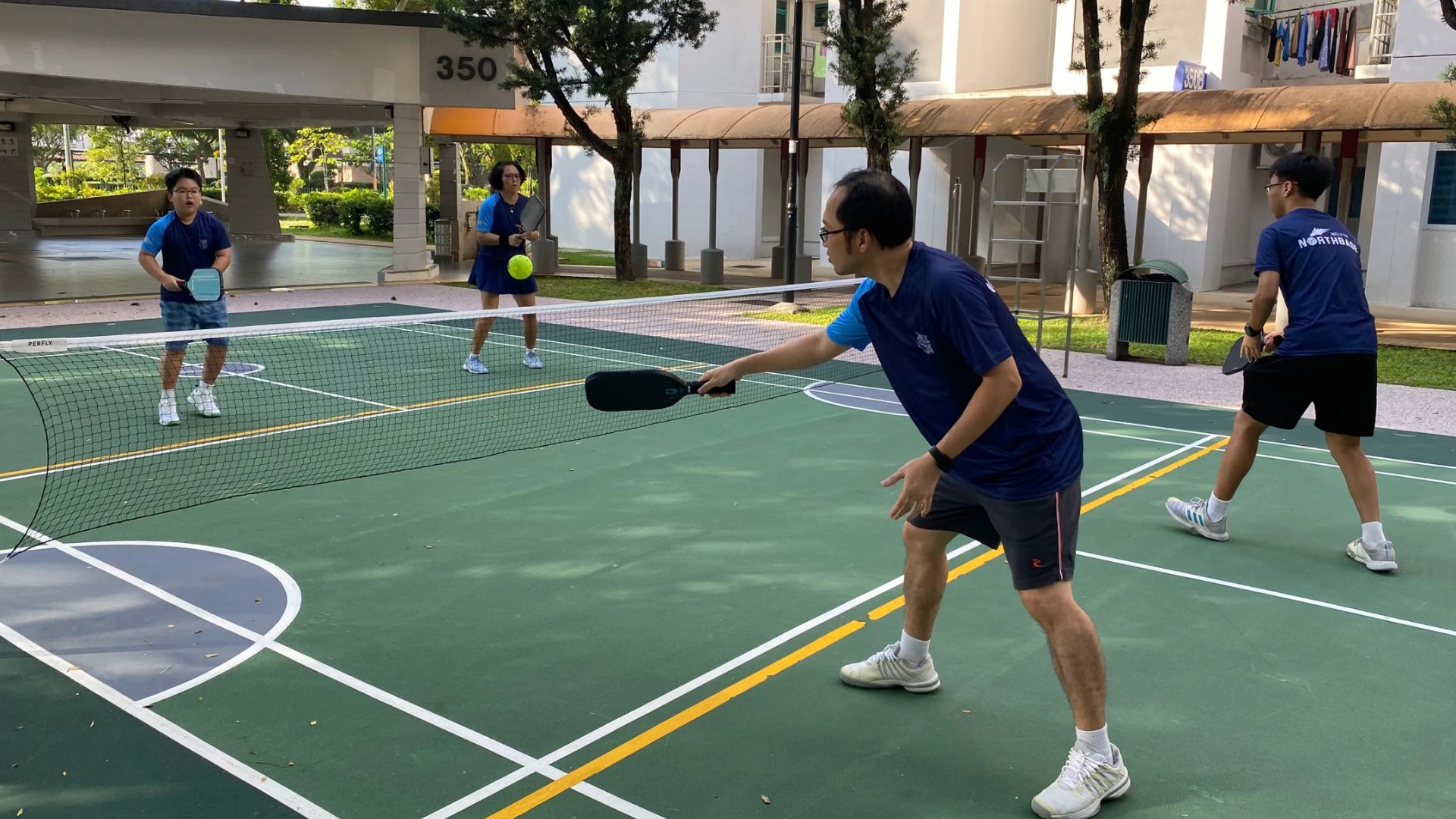
Case Studies: Town Councils Respond to Pickleball Complaints
Local Town Councils have begun grappling with the pickleball noise issue, and their responses offer a glimpse into how such authority is exercised on the ground. Two recent cases – in Marine Parade and Yew Tee – illustrate different approaches within the existing legal framework. Whilst at East Coast, the Town Council decided to ban Pickleball.
Marine Parade: Restricting Play to Preserve Peace
At Marine Parade’s Block 47 Marine Crescent, a multi-purpose hardcourt became a battleground of a different sort when nearby residents complained about daily pickleball sessions. According to one Stomper (resident contributor), a group of mostly senior players had been occupying the court “from 8am” onwards each day, and the repetitive tok-tok sound was echoing up through the flats. Some neighbours reported losing sleep due to the early-morning noise. In response to these complaints, the Marine Parade Town Council swiftly imposed new restrictions on pickleball play at that court. Specifically, the allowed playing hours were curtailed – games can now only be played between 9:00am and 9:00pm, whereas previously players had started as early as 7:30am. This effectively bans any pickleball activity in the early morning hours.
The Town Council’s decision was presumably aimed at securing a quieter dawn for residents. By delaying the start of play to 9am, those who sleep later or work night shifts would not be disturbed at daybreak. From a legal standpoint, the Town Council was within its rights to adjust usage hours on common property. The hardcourt is common property under its management, and the Town Council can regulate its use through estate by-laws or notices (for example, by posting a sign stating the permitted hours for games, which then becomes enforceable). Indeed, Town Council by-laws often empower the Council to set aside specific times or conditions for using facilities, to prevent “danger or discomfort” to others. Noise disturbance falls neatly under that rationale.
However, the move did not go unchallenged. The pickleball community in Marine Parade, many of whom are retirees who value the cooler early hours for exercise, felt the new rule was unfair. They pointed out that other sports commonly played on HDB courts, such as basketball and badminton, were not subjected to a late start time. To these players, it seemed they were being singled out due to one complainant’s gripes. “All this, due to a noise complaint when the traffic and nearby schools produce greater noise pollution,” a petition started by the affected seniors argued. They noted that morning traffic and school activities in the vicinity generate considerable noise. Yet, those are accepted as part of daily life, whereas their pickleball games (which they viewed as harmless) were curtailed. The petition, which urged the Town Council to reinstate the 7:30am start, garnered support from those who see pickleball as promoting active ageing and community bonding.
From a policy perspective, Marine Parade Town Council’s action demonstrates a cautious, resident-centric approach, prioritising the peace of the majority (or at least those who complained) over the recreation of the minority group of players. Legally, the Council likely relied on its estate by-laws authority to post a notice amending the court’s usage hours, or enforced the existing HDB guideline of quiet hours before 7:30am. There was no blanket ban on pickleball; the sport remains permitted, but under stricter time regulations. This measured response addresses the noise at its source (early mornings) without completely denying access to the facility. Still, it raises questions about consistency and fairness – why only pickleball, and should a single noise complainant be able to trigger a change that affects all players? We will revisit these concerns later.
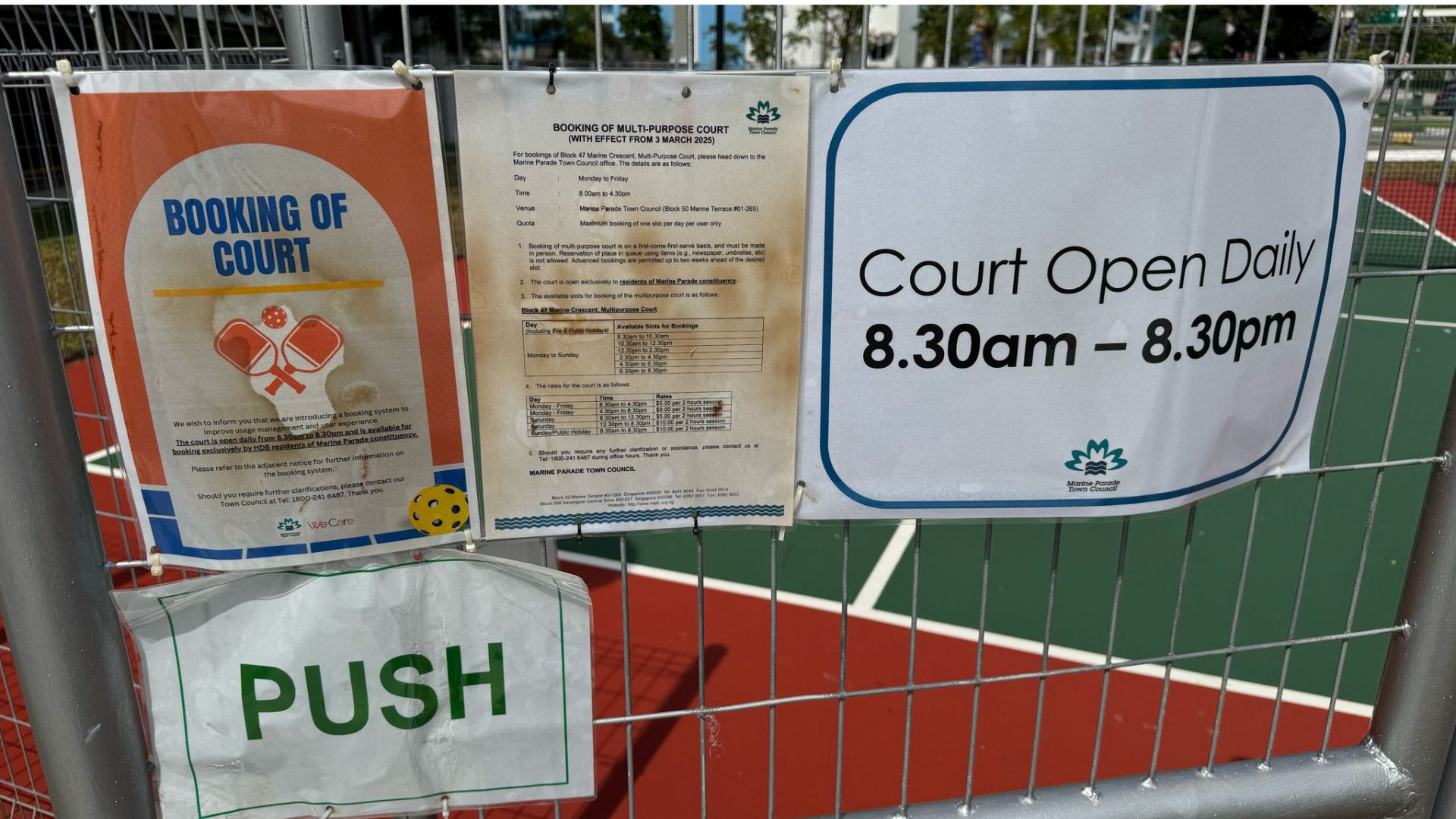
Yew Tee (Choa Chu Kang): Balancing Enforcement with Accommodation
In a Yew Tee estate (near Blocks 636A/B Choa Chu Kang North 6), a different scenario played out. Here, residents were upset about pickleball games taking place at night, sometimes up to 10pm, on a neighbourhood hardcourt. One resident, who had been lobbying the Marsiling-Yew Tee Town Council for months, described the nightly games (often held on Thursdays) as a “major disturbance.” He cited not only the pop of the ball but also players’ occasional cheering and even smoking as nuisances. The resident pushed for an earlier cutoff time, requesting that play stop by 8pm to restore tranquillity in the evenings.
The Town Council’s response in this case was more permissive, carefully adhering to existing guidelines. Marsiling-Yew Tee Town Council acknowledged the complaint but pointed out that “the court is open to the public for multi-purpose games” and that the floodlights are set to turn off at 10pm, per HDB’s estate guidelines. HDB’s general guideline states that noisy activities in common areas shouldn’t continue past 10:30pm. This Town Council proactively capped it at 10:00pm by cutting the lights. In effect, the Town Council was already enforcing a noise curfew even stricter than HDB’s recommendation.
Moreover, the Town Council took steps to monitor the situation rather than immediately shut it down. They informed the complainant that their staff would conduct nightly inspections to gauge noise levels and “advise the group as necessary.” When measured, the noise from the pickleball games was around 50 decibels, which the Town Council noted was “within the acceptable level in a residential precinct.” The Town Council did not ban pickleball at the court. It essentially held the line, allowing play up until 10pm and only once a week, which it deemed a reasonable compromise between estate vibrancy and quiet enjoyment. The fact that the games were infrequent (weekly) and typically concluded by 10pm probably factored into the Council’s decision that a ban or further restrictions were unwarranted. Instead, they addressed the complaint by enforcing existing rules (no activity after 10pm) and by engaging the players to be mindful of noise. Notably, the Town Council even defended the players to some extent, clarifying that they played only once a week, countering any impression of a nightly free-for-all. This suggests a balanced approach: uphold order while also protecting residents’ ability to use standard amenities for recreation.
The Town Council’s stance implies that noise alone, if kept within prescribed hours and decibel levels, was not seen as sufficient grounds to prohibit the sport. This contrasts with the Marine Parade and East Coast Town Council cases, highlighting how different Councils may weigh complaints differently. The local context, including the frequency of play, timing, and possibly the player profiles, influenced the policy response. Yew Tee’s case demonstrates a town council attempting to mediate between competing interests without resorting to outright bans.
East Coast: Bans the playing of Pickleball
The East Coast Town Council has adopted a different approach, issuing a notice prohibiting pickleball at one of its estate courts.
In response to queries, the Town Council clarified that this decision was based on “consistent and repeated feedback from residents” near Block 164 Bedok South Road, who cited significant noise disturbances during early mornings and late evenings. The Council explained that while it recognises the sport’s popularity, the unique acoustics of pickleball, frequent paddle strikes and vocal communication can be especially disruptive in areas with close residential proximity.
“Our priority is to balance the diverse needs of residents within shared spaces,” the Council stated. “We are currently exploring alternative arrangements that would allow for designated pickleball-friendly spaces or scheduled hours that can better manage noise levels while still encouraging healthy lifestyles.”
They also noted that they are studying how other Town Councils handle similar issues and expressed appreciation for the community’s passion and engagement.
This approach contrasts with Town Councils, such as Marine Parade, which imposed time-based restrictions instead of a ban. In that case, complaints about early morning noise prompted a revised rule allowing pickleball only between 9am and 9pm.
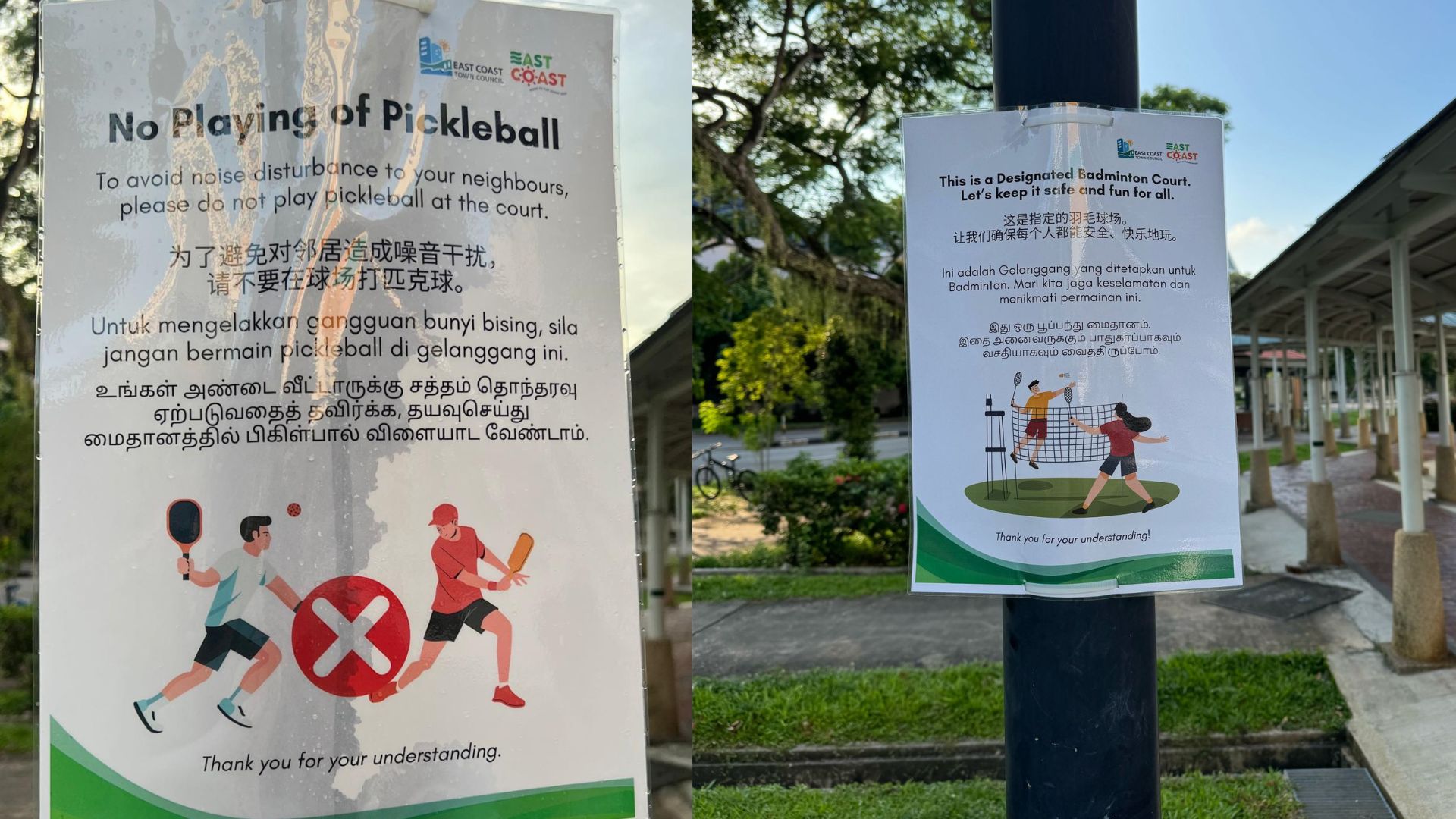
Since we inquired with the Town Council, management has posted a new notice indicating that the multipurpose courts are now designated as a badminton court only. The initial ban, now followed by the designation of the multipurpose court for badminton use only, will surely sow confusion among residents. The large multipurpose facility had been a vibrant location for senior morning exercises and festive gatherings. Is the multipurpose court now only to be used for badminton? These restrictions will curtail any possibility of documenting the noise levels and identifying possible mitigation solutions. It appears that banning an activity or closing facilities is the default approach to addressing noise complaints from residents. In 2023, the Town Council closed the Block 422 street soccer court due to complaints of noise, with plans to repurpose the space for other uses. Netizens then had questioned the closure as an “extreme” move, questioning why the town council couldn’t increase enforcement in the neighbourhood rather than close the facility. Many bemoaned the perceived loss of Singapore’s kampung spirit and neighbourly consideration.
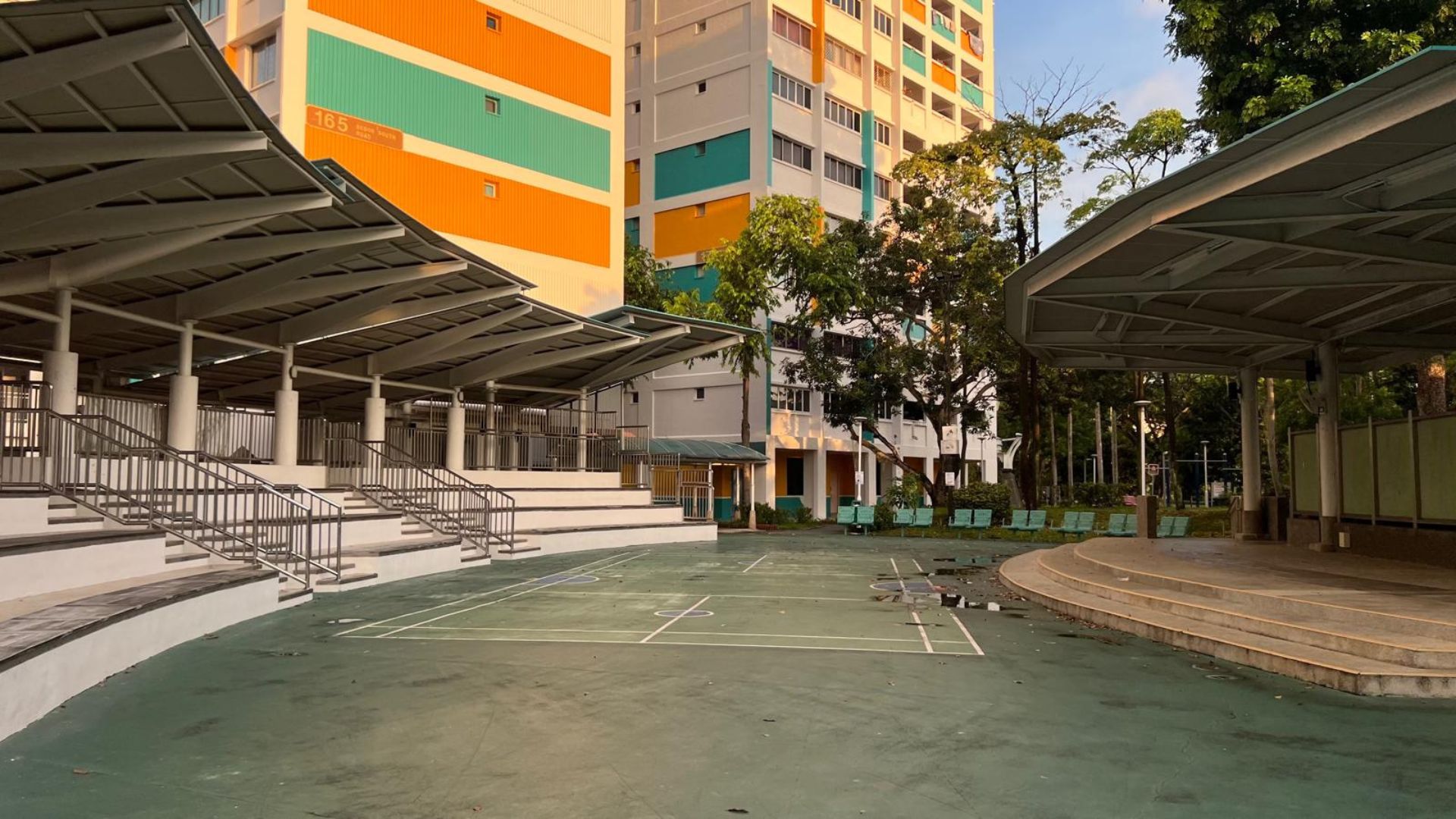
Is Noise Nuisance Sufficient Grounds to Ban a Sport?
The crux of the debate is whether noise annoyance, by itself, justifies banning or severely restricting a legitimate recreational activity, such as pickleball. It’s a question that straddles legal, social, and policy considerations:
-
Legal grounds: Town Councils have the legal authority to regulate the use of common property for reasons including preventing nuisance and discomfort. If a particular activity on common property unreasonably interferes with residents’ enjoyment of their homes (e.g. through loud noise or other disturbance), a Town Council can lawfully step in with by-laws or directives to curb it. In extreme cases, an activity could be prohibited entirely on estate grounds via a by-law. For example, a Council could designate the hardcourt for certain sports only – effectively banning other games not on the list. Noise can legally be deemed a form of nuisance (though, unlike safety hazards or vandalism, it’s subjective and harder to measure). Singapore law doesn’t set specific decibel limits for leisure noise in residential estates during daytime, so Town Councils have discretion. Provided they act within their statutory powers (and not arbitrarily or in conflict with national laws), they can impose rules like “No pickleball after 9pm” or even “No pickleball in this court”. Any such rule would typically be implemented by signage and enforced as a Town Council by-law under the TCA.
-
Precedent and consistency: Just because something can be banned doesn’t mean it should be at the first sign of trouble. Banning a sport outright in common areas would be an extreme measure usually reserved for significant concerns (e.g. safety or property damage). For instance, in the past, certain estates have banned soccer at void decks or basketball at late hours, but often due to broken windows or danger to passersby, rather than solely due to noise. Noise complaints, while legitimate, usually invite a calibrated solution (such as time restrictions or warnings) rather than a blanket prohibition. If Town Councils start banning activities solely due to noise, it could set a troubling precedent. Residents might demand bans on other everyday activities, such as drumming practice, lion dance troupes, or even children’s play, all on the grounds of “noise.” One could argue that if pickleball is banned today for being noisy, will basketball be banned tomorrow when someone complains about the bouncing balls and the shouts of players? After all, a basketball hitting a backboard or a sepak takraw being kicked against a wall also produces sharp sounds. The risk is a slippery slope – a zero-tolerance approach to noise could gradually sterilise community spaces and stifle vibrant use. Shared facilities in HDB estates exist for residents’ enjoyment, and some level of noise is naturally expected when people gather to play or socialise.
-
Noise vs. safety: It’s instructive to compare noise-based restrictions with cases where activities were curtailed due to safety concerns. When personal mobility devices (PMDs) were banned from footpaths in Singapore, it was due to a spate of accidents and injuries. The policy rationale was clear-cut: protecting public safety outweighed the convenience of PMD riders. In the case of pickleball, there is no comparable safety issue – the sport is not dangerous to bystanders (balls are lightweight and courts are usually well away from pedestrian paths). Mr. Chong, president of the Singapore Pickleball Association, noted that pickleball is gentler on the body and “less likely to cause serious injuries” than many other sports. Thus, the justification for any ban rests almost entirely on mitigating annoyance rather than preventing harm or damage. Some observers might question whether that threshold is met: does the discomfort of hearing noise warrant depriving others of a healthy activity? Legally, persistent noise that affects residents’ health or comfort can be seen as a form of environmental pollution, but it occupies a grey area. It’s not as black-and-white as a broken facility or a safety hazard.
-
Community interest and rights: One must also weigh the social benefits of allowing the sport. For many, especially seniors, pickleball is a boon to health, social interaction, and mental well-being. It encourages people to get outdoors and be active, which is highly beneficial to the public. An outright ban in an estate could rob residents of the use of their common space for a meaningful pursuit, essentially because some neighbours find it irritating. This has policy implications: authorities typically promote active lifestyles and “kampung spirit” community activities. Banning a sport runs counter to those objectives unless necessary. There is also the matter of fairness: noise sensitivity varies, and what one resident finds intolerable might barely bother another. Town Councils must be careful that they are responding to genuinely widespread concerns, not just a few vocal complainants. A measured, evidence-based approach is crucial, such as measuring decibel levels (as done in Yew Tee) or observing the frequency and duration of the activity, before deciding on severe restrictions.
In summary, noise alone can be grounds for regulation, but it is a tenuous ground for an outright ban on a recreational sport. From a legal viewpoint, any ban should be defensible as a proportionate response to a persistent nuisance affecting residents’ quality of life. From a policy viewpoint, less draconian solutions should be tried first – e.g. designated hours, equipment modifications – given the competing interest in encouraging community sports. The Yew Tee case suggests that when noise is kept within reasonable limits (during daytime and evening hours and at moderate volume), Town Councils may deem it insufficient to warrant a ban. The Marine Parade case, where early-morning noise was the primary concern, demonstrates that targeted restrictions can mitigate the worst impacts, allowing people to sleep without eliminating the activity. Noise is a genuine concern – chronic sleep disruption, for example, is a health issue – but it typically calls for balancing measures rather than zero-sum outcomes.
One could argue: if pickleball is banned today for being noisy, will basketball be banned tomorrow when someone complains about the bouncing balls and shouts of players? After all, a basketball hitting a backboard or a sepak takraw being kicked against a wall also produces sharp sounds. The risk is a slippery slope – a zero-tolerance approach to noise could gradually sterilise community spaces and stifle vibrant use.
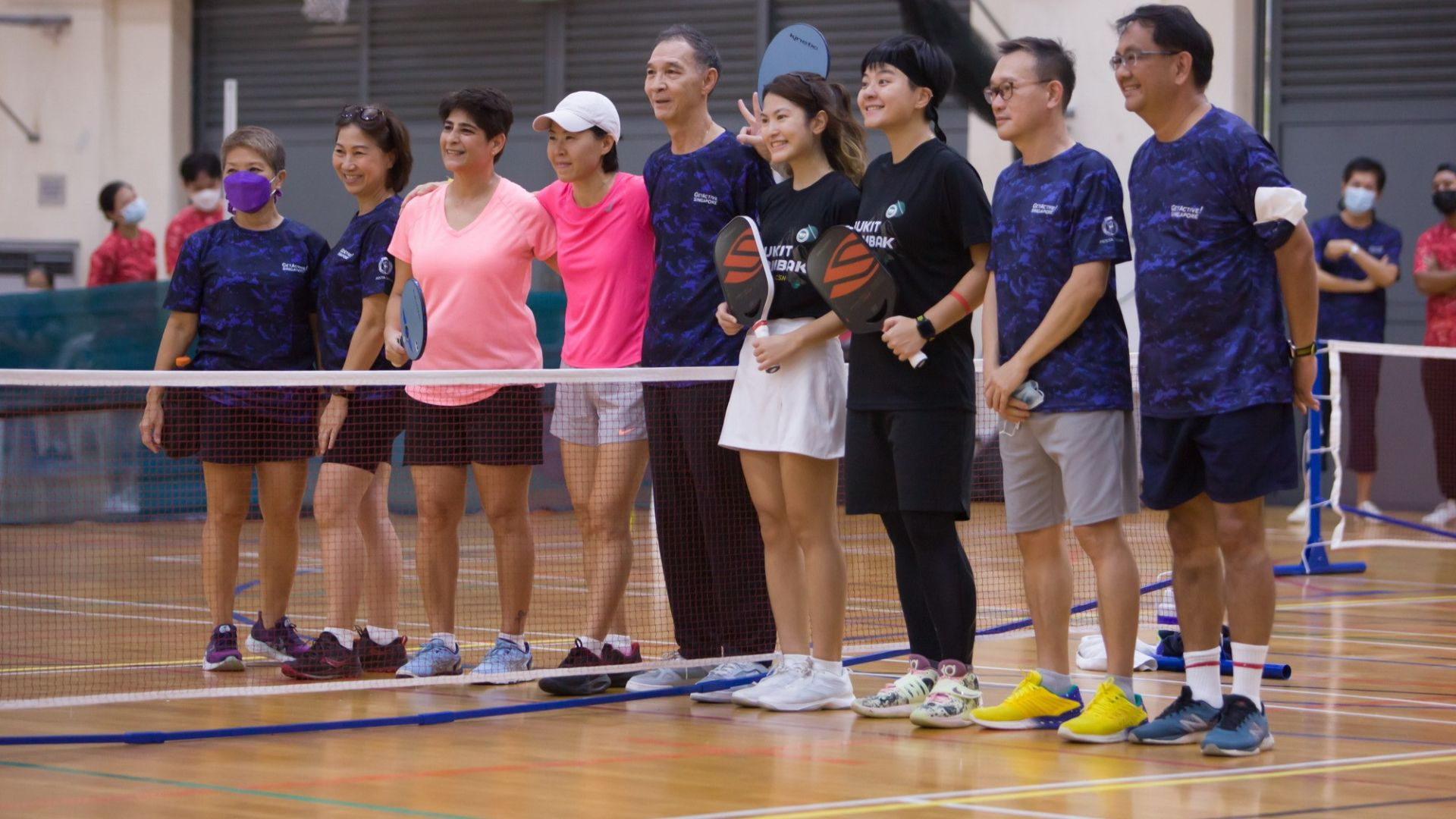
Legal and Policy Rationale Behind Town Councils’ Decisions
Understanding why Town Councils act as they do requires looking at both the legal duties they bear and the policy mindset in estate governance:
-
Ensuring residents’ welfare: Town Councils are politically accountable to the residents in their constituencies. When faced with complaints, especially those related to day-to-day comfort issues such as noise, Town Councils have a strong incentive to be responsive. The legal framework (TCA) reinforces this by expecting Councils to “work… to improve quality of life for residents” and handle nuisances. So, from a rational standpoint, protecting residents’ well-being and peace is a top priority. If pickleball noise is perceived as eroding that peace, the Town Council will feel justified in intervening. In Marine Parade’s case, the rationale was likely that sleep deprivation of multiple residents outweighed the players’ desire for early games – a quality-of-life judgment call. Politically too, ignoring such complaints could be costly, as unhappy residents might escalate matters to MPs or the media (indeed, the issue did end up on Stomp and social media).
-
Avoiding escalation to authorities: Town Councils also have reason to act preemptively to avoid more significant interventions. If they fail to address a persistent noise issue, residents may take it to agencies like the NEA or MND. While the NEA primarily handles industrial or construction noise (excluding recreational noise), it’s not inconceivable that sustained complaints could prompt the HDB or the Ministry to issue directives. The Town Councils Act allows the Minister to disapprove a Town Council’s by-law or require action if estate management problems remain unresolved. Town Councils thus have a policy rationale to nip issues in the bud using their by-law powers, rather than be seen as negligent. By imposing a rule (such as “no play before 9am”), they can demonstrate that they took concrete action to alleviate the nuisance, which is often enough to placate authorities and a segment of residents.
-
Maintaining communal harmony: A softer rationale is the mediation role Town Councils play in communal conflicts. Estate living is dense; conflicts over noise, clutter, or usage of space are common. Town Councils often try to mediate and find middle ground. In Yew Tee, one can discern a rationale for compromise: allow play but end by 10 pm, ask players to cooperate on volume, etc. This approach aligns with broader policy ideals in Singapore of promoting tolerance and neighbourliness, as seen in initiatives such as the HDB’s “Good Neighbours” campaigns. Banning an activity outright can be seen as a last resort because it may breed resentment between players and complainers. Instead, Town Councils may prefer intermediate steps: dialogue with the group, signage reminding users to keep noise down, and enforcement of ending times. Such actions address the problem while attempting to preserve community relations. The policy logic is to solve the problem with minimal infringement on either party’s interests – a form of local dispute resolution.
-
Liability and uniformity concerns: Town councils must also consider whether not acting could expose them to liability or criticism. If a known nuisance goes unchecked and leads to serious consequences (for example, an elderly resident’s health deteriorates due to chronic sleep deprivation), the Council could be seen as failing in its duty. On the other hand, if each Town Council creates wildly different rules (one bans pickleball, while another fully allows it), there may be calls for a consistent policy. Town Councils are somewhat independent, but the Ministry of National Development oversees them broadly. If one town council’s ban is perceived as extreme or unjustified, it could invite scrutiny from the ministry or public pushback that forces a policy reevaluation. Therefore, the rationale often involves seeking alignment with general guidelines (note how MYT Town Council explicitly referenced “HDB guidelines” when justifying the 10pm cutoff). This suggests that Town Councils prefer to frame their decisions in line with national norms rather than arbitrarily.
In summary, Town Councils’ decisions to restrict pickleball stem from a combination of legal obligations to manage common property, pressure to address residents’ grievances, and a desire to maintain harmony and standards. Whether noise alone “suffices” as a reason is judged case-by-case, but in each case, Councils will articulate the decision in terms of resident welfare or compliance with estate regulations – a defensible rationale both legally and in the court of public opinion.
Precedent and Future Governance of Shared Spaces
One important consideration is how today’s responses to pickleball noise could shape the governance of shared spaces going forward. Does banning (or tightly regulating) pickleball set a precedent that might influence other decisions? Several implications come to mind:
-
“Nuisance” as a precedent for intervention: If pickleball is restricted mainly due to being a noise nuisance, it establishes that Town Councils can and will act on nuisance complaints about the recreational use of common areas, even in the absence of safety risks. This could embolden more residents to lodge complaints about other activities they find bothersome. Future Town Councils might find themselves pressured to crack down on all sorts of sounds – be it late-night chatter at the void deck, dawn exercise groups with loud instructors, or evening futsal games on the basketball court. The threshold for what constitutes an intolerable nuisance could be lowered. Today, it’s pickleball; tomorrow, it could be the weekly Zumba-aerobics class at the precinct pavilion or teenagers skateboarding in the plaza. In a diverse community, one person’s enjoyment can be another’s irritation. If a norm develops that the irritated party “wins” by getting the activity curtailed, Town Councils may face a barrage of demands to ban this or that. The governance challenge will be drawing consistent lines on what is an acceptable use of shared space. Town Councils will need to avoid knee-jerk bans and instead develop criteria (e.g. time, place, manner restrictions) that can be applied evenly across activities.
-
Chilling effect on community life: A precedent of readily banning noisy activities could gradually erode the vibrancy of HDB estates. Residents might self-censor, avoiding the use of the courts or organising events for fear of complaints. This is contrary to the ethos of multi-generational community living that Singapore promotes. Shared facilities are designed for use – they are investments that encourage play, bonding, and healthy living. If a ban on pickleball were to go unchallenged, it might send an unintended message that “if in doubt, don’t use the space”. For example, will RCs (Residents’ Committees) hesitate to hold a loud Mid-Autumn festival event at the void deck because someone could cite this precedent and object? Or will seniors forgo their daily tai chi music because it might be considered “noise”? Setting a ban precedent could make Town Councils more risk-averse in allowing community-led activities, undermining the community spirit over time.
-
Demand for clearer regulations: On the positive side, these pickleball episodes could spur the clarification of rules around shared space usage. Currently, much remains at the discretion of individual Town Councils. A high-profile ban or dispute might lead to calls for a standardised policy or explicit inclusion of certain sports in the bylaws. For instance, if more Town Councils start seeing pickleball conflicts, the governing authorities (MND or perhaps People’s Association for CCs) might issue an advisory or template on how to handle it uniformly. Precedents, especially those that are controversial, often prompt higher-level policy guidance to ensure fairness and consistency. Already, we see reference to HDB’s noise guideline (10:30pm cutoff) acting as a loose national standard. A Town Council that goes one step further, like East Coast Town Council, banning pickleball outright at all times, has been seen as deviating from the norm, inviting scrutiny. Future governance may involve codifying specific quiet hours for estates or listing permitted sports per facility, thereby avoiding ad-hoc decisions.
-
Residents’ recourse and engagement: Another outcome of such precedents is the increased involvement of residents in decision-making. The Marine Parade case saw affected residents mobilise via a petition on change.org. If Town Councils move to ban activities, we can expect more community pushback in the form of petitions, appeals to MPs, or even the use of mediation channels like the Community Disputes Resolution Tribunals (though the latter typically handles neighbour-to-neighbour disputes, not residents vs. Town Council). This could be healthy for participatory governance, compelling Town Councils to consult residents more broadly before drastic actions. A precedent of banning without consultation might draw criticism that the Council is not considering all stakeholders. Going forward, town councils may adopt more consultative approaches, such as surveys and dialogue sessions, when revising the rules governing common space use, recognising that any ban can set a far-reaching precedent.
In essence, how Town Councils handle pickleball is being watched as a test case of balancing community tolerance with individual grievances. An overly restrictive ban, as instituted by the East Coast Town Council, could set an overly cautious tone, whereas a well-managed compromise could become a model for harmonious coexistence. Policymakers likely recognise this; hence the importance of guiding Town Councils toward balanced solutions rather than heavy-handed edicts.
If pickleball is restricted mainly due to being a noise nuisance, it establishes that Town Councils can and will act on nuisance complaints about the recreational use of common areas, even in the absence of safety risks. This could embolden more residents to lodge complaints about other activities they find bothersome. Future Town Councils might find themselves pressured to crack down on all sorts of sounds – be it late-night chatter at the void deck, dawn exercise groups with loud instructors, or evening futsal games on the basketball court. The threshold for what constitutes an intolerable nuisance could be lowered.
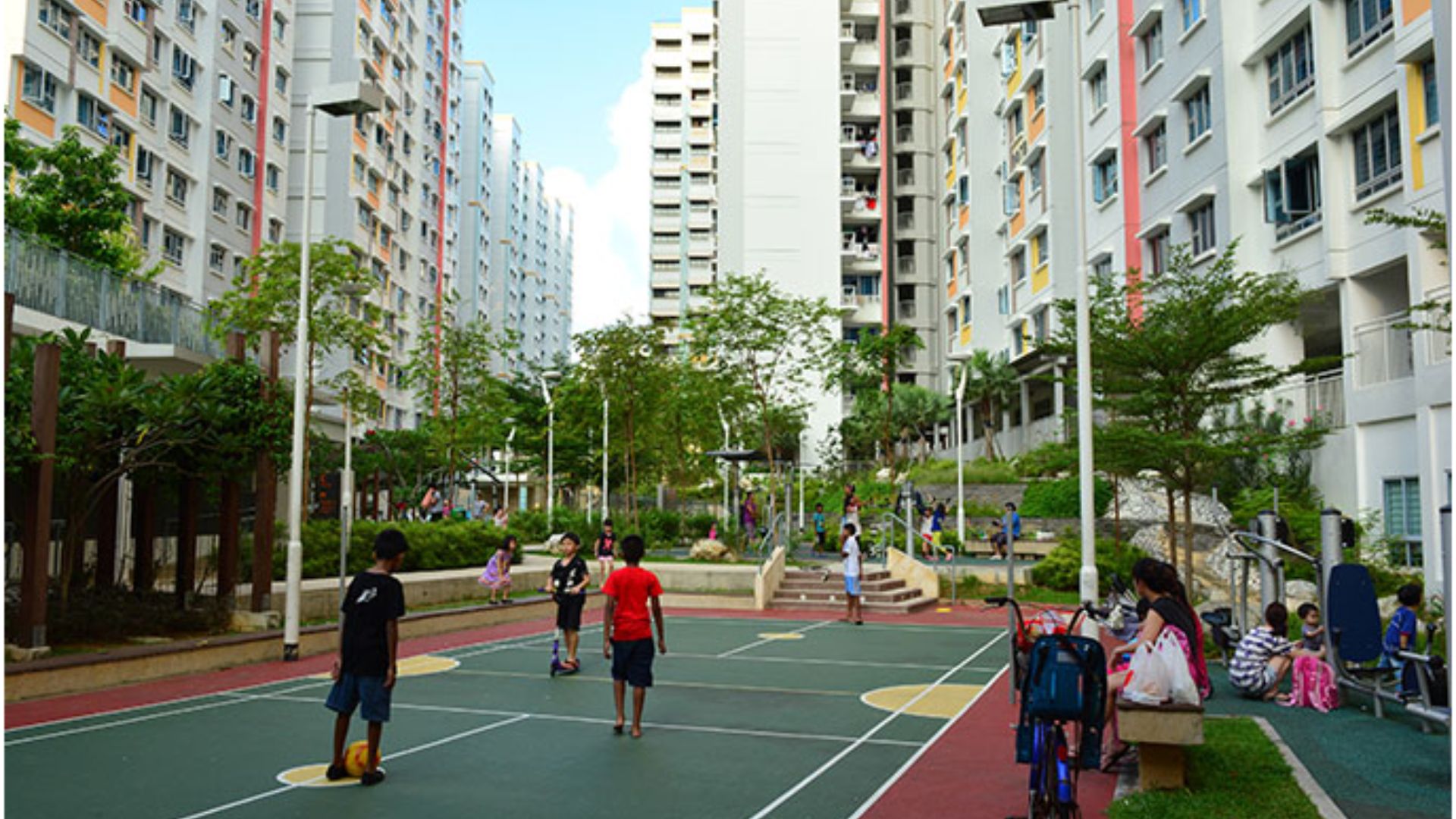
Towards Balanced Solutions: Recommendations for Policy Reform
The conflicts over pickleball reflect a broader need to update our approaches to managing shared spaces in densely populated areas. Rather than knee-jerk bans, a more balanced suite of solutions can protect residents’ rights to peace and quiet while supporting community wellness through sport. This requires coordination at the national policy level, providing Town Councils with consistent tools and guidelines across Singapore. Key recommendations include:
-
Standardised Court Usage Guidelines: It would be beneficial for MND, HDB, or a coordinating body of Town Councils to establish clear, standard guidelines on the use of common courts and facilities across all estates. This can build on the existing 10:30pm noise cutoff by perhaps extending it into a full policy: for example, “No loud ball games before 7 or 8am, and after 10pm, in any estate.” If every Town Council adheres to the same quiet hours, residents and players will know the rules regardless of where they live. Such guidelines should be evidence-based, perhaps allowing slightly later start times on weekends compared to weekdays, taking into account community norms. By making these rules uniform, we avoid the situation where one town bans pickleball outright, while another allows it to be played unregulated. Consistency helps manage expectations. It also gives Town Councils a stronger footing to enforce rules (“these hours are the national standard” carries more weight than “we decided on our own”). Importantly, any guidelines should involve input from both residents and sports interest groups to ensure they are seen as fair. Singapore could even consider developing a code of conduct for estate sports (covering not just pickleball but also basketball, futsal, etc.), to be displayed at courts, reminding players to be considerate (avoid excessive shouting and refrain from peak rest hours) and informing residents that some noise is normal during permitted times.
-
Structured Playtime and Booking Systems: To reduce conflicts, Town Councils might implement a structured schedule for shared courts, especially those in high-demand or close to residential blocks. Rather than an unchecked free-for-all, there could be allocated slots for different activities or groups. For example, mornings could be reserved for exercises and quieter games, late afternoons for youth sports, and evenings for adult games like pickleball or basketball, with a hard cutoff time. Some estates have informal arrangements (seniors often informally “own” the early morning slot for tai chi, etc.); however, formalising it could be beneficial. A simple booking system, such as a whiteboard on-site or an online reservation platform, could prevent overuse by one group and provide neighbours with predictable “quiet windows”. Structured rotations ensure that no single activity, and its associated noise, dominates the entire day. If players know they have, say, a 5-7pm pickleball slot, they can plan accordingly, and residents know when to expect noise. This approach requires community cooperation and perhaps an overseer (RC volunteers or the Town Council’s estate management) to coordinate, but it can significantly reduce friction. It also promotes sharing as multiple interest groups have the opportunity to use the facility in turn. Policymakers can pilot such schemes in selected estates, gathering feedback from users, and then roll out best practices more widely.
-
Sound Mitigation Measures: Technology and design can play a massive role in reconciling sports with serenity. Instead of removing the sport, reduce the noise. The government, possibly through Sport Singapore or HDB’s estate upgrading programmes, could fund and deploy sound-mitigating solutions in noise-sensitive areas, such as courts. One promising measure is the use of acoustic barriers or sound-dampening panels around courts. For instance, specially designed echo barriers can be hung on the existing wire fencing of a court to absorb noise impact. Unlike solid walls, these fabric-like barriers absorb sound without reflecting it, thereby reducing the noise that escapes into the surrounding area. They have been used in the U.S. and elsewhere to address pickleball noise and could be tested in Singapore’s context. Another approach is to plant dense greenery as a natural sound buffer around courts, although space constraints in estates may limit this option. Additionally, encouraging or subsidising quieter equipment could help. Manufacturers are developing lower-noise pickleballs and paddles, such as balls made from softer materials and paddles with sound-dampening cores. While not yet mainstream, if Town Councils or sports bodies provided these to community groups at low cost, players might adopt them. A national standard (or even a certification) for “low-noise” sports equipment could be considered, similar to the noise ratings for leaf blowers or generators. Incentivising players to switch to quieter gear (through education or provision) directly tackles the root cause of the noise without banning the activity. Overall, investing in engineering solutions aligns with Singapore’s approach of leveraging innovation to address urban challenges, enabling sports and residents to coexist more harmoniously.
-
Mediation and Community Engagement: Policy reform should also emphasise process, not just rules. When conflicts like the pickleball one arise, structured mediation or dialogue facilitated by a neutral party can help. Rather than a resident firing off emails and the Town Council issuing edicts in isolation, a sit-down session between the complainants and the players, with Town Council officers or grassroots leaders mediating, could foster mutual understanding. The players might agree to reasonable adjustments (e.g., using foam balls during certain hours or refraining from loud chatter at night), and the complainants might realise the community benefits of the sport and agree to tolerate it within set limits. The Government could establish a formal avenue for such disputes – perhaps by expanding the Community Mediation Centre’s remit to cover organised activities in estates, or by training Town Council staff in mediation skills. The outcome of a successful mediation could be a social contract of sorts: documented agreements on dos and don’ts, which the Town Council can then help enforce informally. This bottom-up conflict resolution ensures that solutions are tailored to the specific community, preventing hard feelings that can arise when a ban is imposed unilaterally. Ultimately, nurturing a culture of consideration on both sides – “be mindful of noise” and “be tolerant of community activities” – is the best long-term policy. National campaigns or local workshops on being a good sports neighbour could reinforce this culture.
-
Review of Town Council By-Laws: Finally, it may be timely to review the model Town Council by-laws and the Town Councils Act in light of new trends, such as pickleball. The current by-laws (many drafted in the 1990s) did not foresee this sport and largely treat all “games” generically. Perhaps new provisions can be introduced to address repeated disturbance, for example, empowering Town Councils to issue specific noise abatement directions to groups that misuse common property, before considering any ban. Additionally, clarifying the process for residents to provide feedback and for Town Councils to publicise changes (such as Marine Parade TC’s new hours rule) could enhance transparency. If every Town Council had to publish such changes on a website or noticeboard (as the Act requires for by-law changes), residents would be better informed and able to voice their concerns. A standardized approach to enforcement (patrols with sound meters, etc.) can also be part of the policy reform – ensuring Town Councils base decisions on data (decibel readings, number of complaints) and follow a graduated response matrix (e.g. first time: warning; second time: restrict hours; last resort: prohibit for a period). By updating the regulatory framework to reflect modern recreational patterns, we can avoid ad-hoc bans and instead equip Town Councils with a clear protocol for managing noise issues.
Conclusion
Pickleball’s noise dilemmas in our HDB heartlands highlight the growing pains of shared living in a changing Singapore. Legally, Town Councils do have the authority under the Town Councils Act and by-laws to curtail activities on common property in the interest of residents’ comfort. And certainly, when noise shifts from mere background buzz to a genuine nuisance, intervention is warranted. No resident should be forced to sacrifice basic rest or sanity due to an unrelenting noise outside their window. Town Councils that have stepped in (like in Marine Parade) have done so with the intention of restoring a balance, not out of caprice. Yet, as we have explored, noise alone is a nuanced justification. It demands a careful balancing of interests and a search for creative solutions, rather than a blunt ban, wherever possible.
The experiences in Marine Parade and Yew Tee offer a roadmap of contrasts: one leaned toward stricter regulation to placate annoyed residents, while the other leaned toward accommodating play within reasonable limits. Both approaches were rooted in the Town Councils’ duty to manage the estate, and neither was inherently wrong, as they were tailored to local circumstances. Moving forward, however, the goal should be a more uniform and proactive strategy that doesn’t make any sport a zero-sum casualty of neighbour disputes. If we handle this well, Singapore can set an example of how densely populated communities adapt to new recreational trends: through smart design, clear rules, and mutual respect, rather than through prohibitions.
Ultimately, protecting residents’ quiet enjoyment and promoting community wellness need not be opposing goals. With national-level guidance, whether it’s consistent quiet hours, the installation of noise buffers, or scheduled playtimes, we can transform potential flashpoints into opportunities for community building. Imagine an estate where pickleball enthusiasts play on sound-dampened courts at considerate hours, some residents join in the fun, and others enjoy peace in their flats – all coexisting amicably. This vision is achievable if policymakers and Town Councils take the current pickleball friction as a catalyst for constructive change. Banning pickleball outright would be the easy way out; the better path is to manage it, innovate around it, and in doing so, reaffirm that our shared spaces can indeed be shared by all.
RELATED: Opinion | The Risk of Sameness: Why Diverse Voices Matter in Singapore’s Politics
Join the conversations on TheHomeGround Asia’s Facebook and Instagram, and get the latest updates via Telegram.














